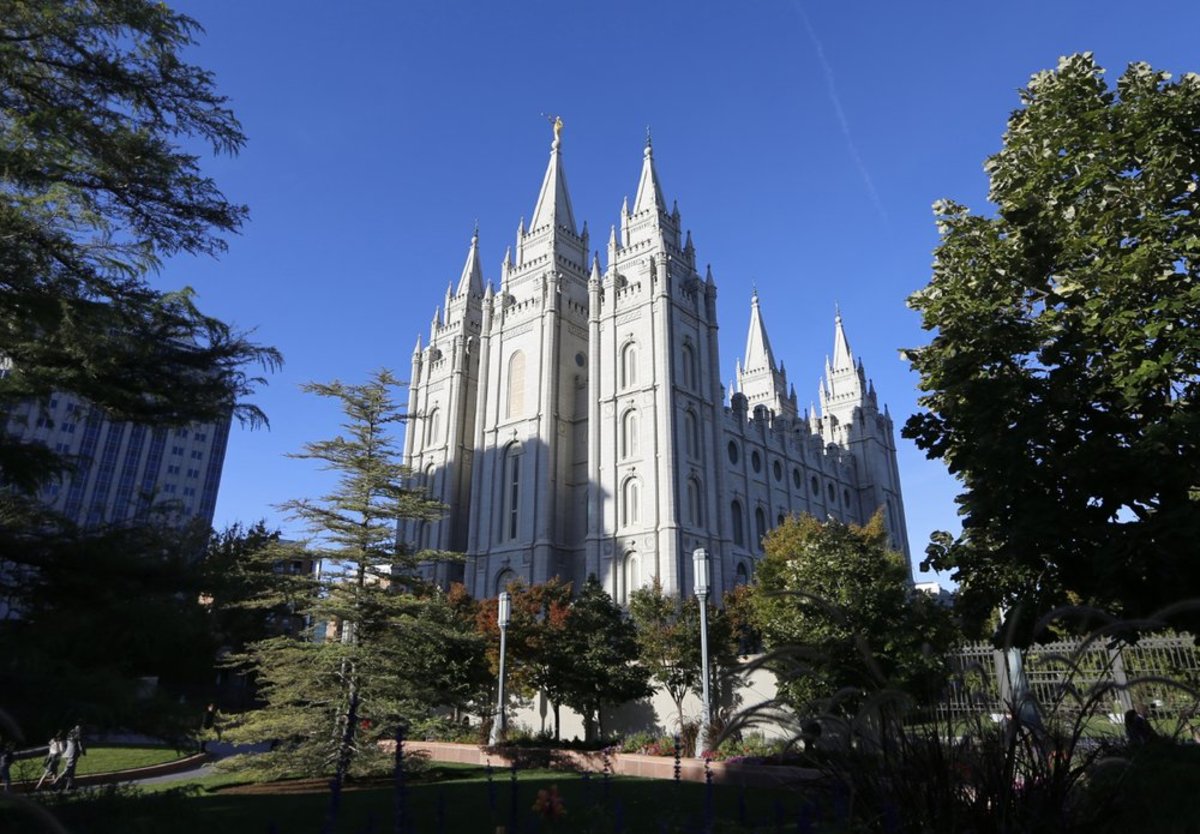Cain and Abel Series: The Counterfeit Priesthood of Cain (Episode Four)
The smoke from Cain’s rejected altar had barely faded before a deeper conflict arose—the question of who could speak for God. Cain’s pride, already festering, now turned to ambition. His offering had been an act of independence; his next act would be one of imitation.
The Pride of Cain — From Heir to Heretic (Episode Three) revealed the heart that rebelled. This installment reveals the system that rebellion produced. When obedience is replaced by self-will, worship mutates into priestcraft, and divine authority becomes a performance rather than a stewardship.

Author’s Note
The images in this and other articles within the Cain and Abel Series depict the First Family of Adam and Eve symbolically. They are not intended to portray their actual appearance.
The differing racial heritages represented across these images emphasize the universality of the family of God and avoid any suggestion of cultural or ethnic bias. Skin color, facial structure, and visual style are secondary to the spiritual work and divine covenants that define these figures.
Some renderings follow traditional Christian-inspired imagery, while others reflect the full spectrum of humanity—reminding us that all are alike unto God (2 Nephi 26:33).
The Priesthood Given Before the Fall
Before the world was formed, God entrusted Adam—known in heaven as Michael—with authority to act in His name. That authority, the Holy Priesthood after the Order of the Son of God, was not invented by mortals; it descended from eternity. President Joseph Smith II, the first prophet of the Last Dispensation of priesthood authority before the coming of Jesus Christ taught:
The Priesthood was first given to Adam; he obtained the First Presidency, and held the keys of it from generation to generation. He obtained it in the Creation, before the world was formed, as in Gen. 1:26, 27, 28. He had dominion given him over every living creature.He is Michael the Archangel, spoken of in the Scriptures.
Then to Noah, who is Gabriel; he stands next in authority to Adam in the Priesthood; he was called of God to this office, and was the father of all living in his day, and to him was given the dominion. These men held keys first on earth, and then in heaven. [1]
Through Priesthood, “the power of godliness is manifest in the flesh” (D&C 84:19–22).
Adam carried this stewardship into mortality. It was more than ceremony—it was covenant administration. In the Garden, he presided under divine commission; outside it, he presided by faith. When the Lord clothed Adam and Eve in skins, He symbolized through this act both protection and priesthood covering.
As their children multiplied, Adam taught them the ordinances revealed by an angel: the sacrifice of the firstlings of the flock, a similitude of the Only Begotten (Moses 5:7–9). Through these ordinances, humanity learned that worship required mediation and that priesthood was the bridge between heaven and earth.
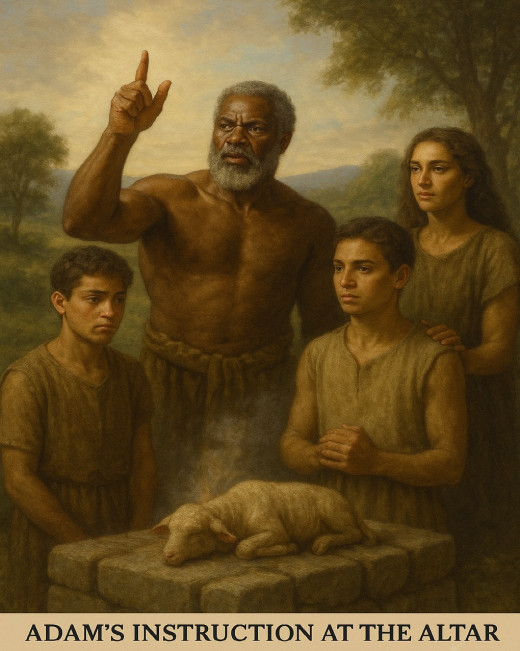
Continuity of Divine Order
Scripture records that “the keys of this priesthood … have come down from the beginning” (D&C 84:17). Adam’s ordination established the first presidency of the human family—his stewardship patterned after the celestial order. That same authority will, at some future time, if not at present, be gathered again at Adam-ondi-Ahman (D&C 107:53–57; 116).
The divine pattern is consistent: priesthood flows through righteousness, not merely lineage. Each generation must qualify through obedience. Where obedience wanes, revelation ceases; where revelation ceases, power departs.
Cain would test that Truth to its breaking point.
Adam Ordaining His Posterity to Priesthood Authority
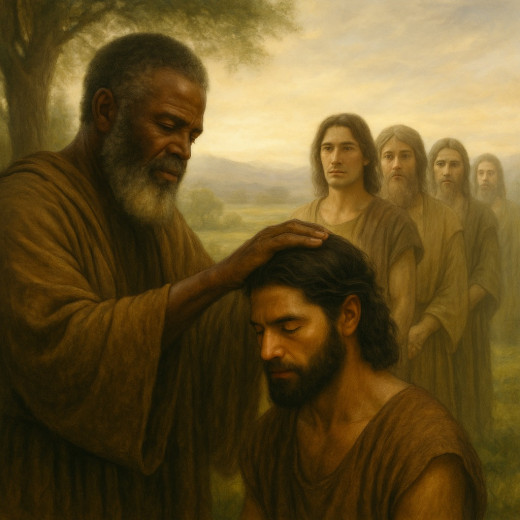
Cain’s Imitation of Worship
Cain, still trained in priesthood ordinances, chafed under their discipline. He desired the appearance of godliness without its submission. When the Lord required sacrifice from the flock, Cain offered produce from the field—an act of self-determination that transformed ordinance into opinion and personal preference based on limited experiential mortal knowledge juxtaposed with God's infinite eternal reality..
Cain's body performed a supposed function of the priesthood, but without the requisite faith to do it as prescribed by Adam, the first High Priest under Jesus Christ. His altar smoked, but heaven stayed silent.
God’s refusal of this incorrect offering was not a rejection of his labor; it was a rejection of alterations Cain introduced, inspired by the dark forces of pride, self-worship, and power-seeking. The ordinance did not reflect the Covenant based on submission to the will of God. It was innovation. However well-meant, it severs the connection to God's authority.
President Spencer W. Kimball cautioned, intimating the spiritual heritage Cain foisted upon humanity that has evolved into multiple faith cultures today, that modern idolatry arises when we replace devotion with convenience—when comfort becomes the measure of worship. He taught,
In spite of our delight in defining ourselves as modern, and our tendency to think we possess a sophistication that no people in the past ever had—in spite of these things, we are, on the whole, an idolatrous people—a condition most repugnant to the Lord.
We are a warlike people, easily distracted from our assignment of preparing for the coming of the Lord. When enemies rise up, we commit vast resources to the fabrication of gods of stone and steel—ships, planes, missiles, fortifications—and depend on them for protection and deliverance. When threatened, we become antienemy instead of pro-kingdom of God; we train a man in the art of war and call him a patriot, thus, in the manner of Satan’s counterfeit of true patriotism, perverting the Savior’s teaching:
“Love your enemies, bless them that curse you, do good to them that hate you, and pray for them which despitefully use you, and persecute you; That ye may be the children of your Father which is in heaven.” (Matt. 5:44–45.) [2]
Cain’s preference became his gospel. He believed in the counterfeit gospel he developed with the help of Lucifer, the father of self-worship and idolatry.
Cain's body performed a supposed function of the priesthood, but without the requisite faith to do it as prescribed by Adam, the first High Priest under Jesus Christ. His altar smoked, but heaven stayed silent.
Abel's Offering Went Up / Cain's Offering Wasn't an Offering to God
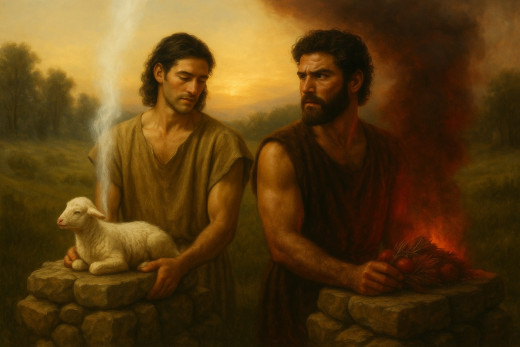
Authority Replaced by Ambition
When Cain’s countenance fell at the rejection of his altered plan, the Lord reasoned with him:
“If thou doest well, thou shalt be accepted. And if thou doest not well, sin lieth at the door.” (Moses 5:22–23)
Those words framed the doctrine of agency. God does not force; He asks us to repent, to change for the better. He warns, invites, and withdraws if we refuse Him. In that moment, Cain stood between stewardship and sovereignty—whether to serve under God or reign apart from Him.
Pride reigned within him, and he proceeded without God by choice. What Cain could not gain by faith, he sought by strategy. He began to reinterpret ordinances, teaching others that his version was equally valid. Thus was born the first counterfeit priesthood—a hierarchy of influence divorced from revelation.
We learn by sad experience, the Lord later declared, that it is the nature and disposition of almost all men, as soon as they get a little authority, as they suppose, to exercise unrighteous dominion. —D&C 121:39
Cain became the prototype of that warning. He exercised power without light, ceremony without covenant, and leadership without love. He had become like his new master was from the beginning, a fallen son of God.
Adam The Ancient of Days
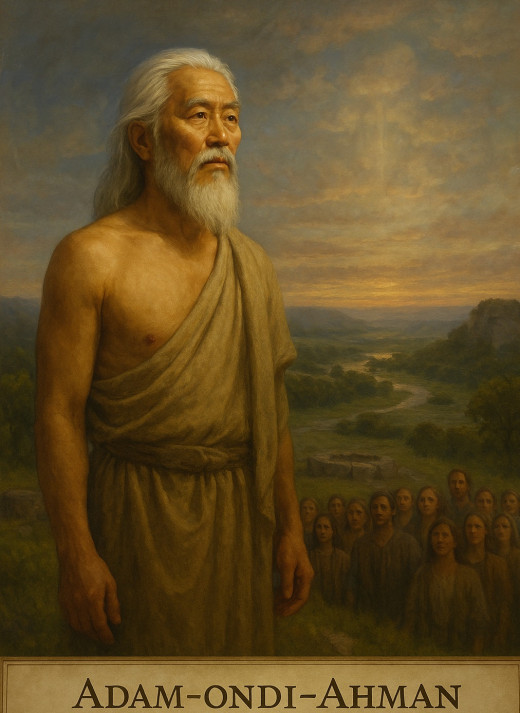
Adam’s True Stewardship Contrasted
While Cain turned inward, Adam gathered outward.
In the valley later called Adam-ondi-Ahman, the first patriarch assembled his righteous posterity before his death to bless them (D&C 107:53–57). He wanted to continue the correct priesthood line of connection to God despite all that had happened with his family since he became mortal. That ancient council foreshadowed a future one, when the same keys will be returned to Christ (D&C 116).
From an academic perspective, these councils frame priesthood covenant continuity. Adam’s presidency represented transparency, accountability, and faith. Cain’s counterfeit represented secrecy, coercion, and ambition. One built a Zion family; the other, a faction.
“The same priesthood that was in the beginning shall be in the end of the world also.” (D&C 27:13)
Every dispensation thus begins with restoration and ends with rejection—the cycle Cain inaugurated. Yet even in apostasy, God preserves a remnant who remember the order of the Son. He will restore it as often as necessary until His work regarding the futurity of humanity is completed.
Adam holds the keys of the dispensation of the fullness of times; i.e., the dispensation of all the times have been and will be revealed through him from the beginning to Christ, and from Christ to the end of all the dispensations that are to be revealed.
— Joseph Smith II (Jr.)The Divine Warning Revisited
The Lord’s counsel to Cain remains one of scripture’s purest statements on moral agency. It joins warning with mercy, judgment with possibility. As one apostle. Elder D. Todd Christofferson, taught,
I would like to speak of one particular attitude and practice we need to adopt if we are to meet our Heavenly Father’s high expectations. It is this: willingly to accept and even seek correction. Correction is vital if we would conform our lives “unto a perfect man, [that is,] unto the measure of the stature of the fulness of Christ” (Ephesians 4:13).
Paul said of divine correction or chastening, “For whom the Lord loveth he chasteneth” (Hebrews 12:6). Though it is often difficult to endure, truly we ought to rejoice that God considers us worth the time and trouble to correct. [3]
God’s question—Why art thou wroth?—was the door of hope before the gate of despair.
Had Cain humbled himself, priesthood could have remained his inheritance. Instead, he mistook counsel for criticism and turned warning into warfare. Heaven withdrew; silence replaced instruction. Rebellion, once private, soon became policy—and the adversary found his first mortal ally.
Conclusion — When Power Replaces Purpose
Cain’s tragedy teaches that priesthood is not power to command but power to bless. When the gift is treated as status, it ceases to function. Divine authority cannot coexist with self-exaltation; it operates only through persuasion, patience, and love unfeigned (D&C 121:41–42).
The counterfeit priesthood of Cain still echoes in every age—whenever ambition disguises itself as inspiration, or authority is sought without accountability. Yet God’s true order endures, for the light shineth in darkness, and the darkness comprehendeth it not.
Continue to “The Rise of Secret Combinations — Satan’s Counterfeit Kingdom (Episode Five)”, where Cain’s rebellion matures into an organized imitation of heaven’s hierarchy.
Referenced Sources
[1] Teachings of Presidents of the Church: Joseph Smith (2007 edition), “Chapter 8: The Everlasting Priesthood,” section titled “The priesthood is everlasting and has been held by prophets in every dispensation.”
[2] Spencer W. Kimball, The False Gods We Worship, Ensign, June 1976.
[3] D. Todd Christofferson, As Many as I Love, I Rebuke and Chasten, General Conference, Apr. 2011.
Next and Previous Episodes in the Cain and Abel Series
- Cain and Abel Series: The Rise of Secret Combinations — Satan’s Counterfeit Kingdom (Episode Five)
Cain’s covenant with Satan forged the first secret combination—a counterfeit kingdom built on lies, oaths, and blood. Discover how rebellion evolved into organized corruption and why that ancient pattern still haunts humanity. - Cain and Abel Series: The Pride of Cain — From Heir to Heretic (Episode Three)
Discover why God rejected Cain’s offering and how pride transformed the first priesthood heir into history’s first heretic. Explore the link between Lucifer’s rebellion and Cain’s downfall in this study of pride, power, and lost divine favor.
This content is accurate and true to the best of the author’s knowledge and is not meant to substitute for formal and individualized advice from a qualified professional.
© 2025 Rodric Anthony Johnson



